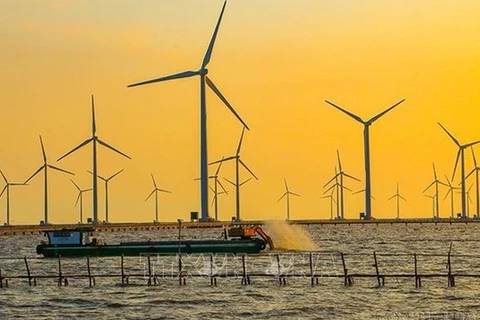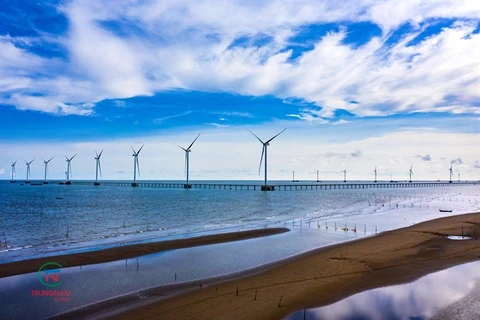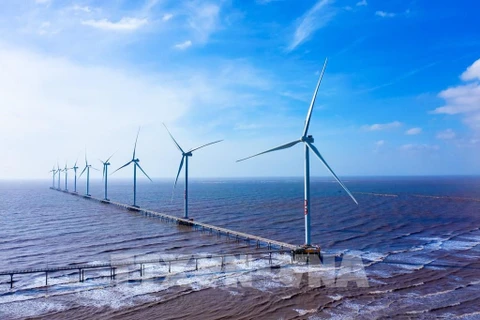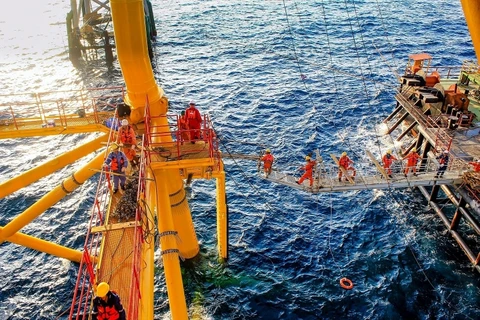Hanoi (VNS/VNA) - The Ministry of Natural Resources and Environment has proposed a temporary halt on appraisal and approval for the surveying of offshore wind power projects due to a number of legal and technical problems.
The ministry said that it had received many proposals about offshore wind power surveying, including wind measurement, environmental monitoring and environment impact assessment, which would be served for the appraisal and approval of the location, area, coordinate, depth and time for carrying out the surveying.
As of the end of August, the ministry received 55 proposals. Only one proposal was approved which was a wind measurement proposal by a domestic investor to install an off-shore wind Lindar station as a preparation for the feasibility report of Ben Tre offshore wind power plant.
The proposals submitted to the ministry were estimated to have a total capacity of 100GW and a total sea area of about 30,000sq km.
There were about 40 surveying proposals submitted to authorities of coastal localities, all of which were from domestic investors.
The figures demonstrated that offshore wind power was attracting significant interests of investors.
Statistics from the Institute of Energy under the Ministry of Industry and Trade, revealed 22 new projects with a total capacity of 51,650MW were proposed to be added to the national planning in the northern region running from Quang Ninh to Quang Trị. In the central and southern regions, 74 new offshore wind power projects with a total capacity of 104,627 MW were proposed.
The ministry said developing offshore wind power was appropriate to the orientation of sustainable marine economy development and the commitment at COP26 to achieve net zero emissions by 2050.
There were mixed opinions over allowing or not allowing organisations and individuals to conduct wind measurement, geological and topographic surveys at sea, the ministry said, however.
The ministry proposed temporary halt on the surveying until a resolution about wind measurement, monitoring and geological and topographical surveys is issued.
The ministry also added that the existing legal procedures related to offshore wind power development remained complicated. Besides, there was a shortage of technical instructions about the monitoring area for each 1MW capacity because each area would have different wind speed, density and topography.
In addition, Vietnam had not had planning for sea areas with potential for wind power development.
Under the national power development plan for the 2021-2030 period, with a vision towards 2045, Vietnam targeted to increase wind power capacity from nearly 4,000MW in 2022 to about 16,121MW onshore and nearshore and 7,000MW offshore wind power by 2030./.
The ministry said that it had received many proposals about offshore wind power surveying, including wind measurement, environmental monitoring and environment impact assessment, which would be served for the appraisal and approval of the location, area, coordinate, depth and time for carrying out the surveying.
As of the end of August, the ministry received 55 proposals. Only one proposal was approved which was a wind measurement proposal by a domestic investor to install an off-shore wind Lindar station as a preparation for the feasibility report of Ben Tre offshore wind power plant.
The proposals submitted to the ministry were estimated to have a total capacity of 100GW and a total sea area of about 30,000sq km.
There were about 40 surveying proposals submitted to authorities of coastal localities, all of which were from domestic investors.
The figures demonstrated that offshore wind power was attracting significant interests of investors.
Statistics from the Institute of Energy under the Ministry of Industry and Trade, revealed 22 new projects with a total capacity of 51,650MW were proposed to be added to the national planning in the northern region running from Quang Ninh to Quang Trị. In the central and southern regions, 74 new offshore wind power projects with a total capacity of 104,627 MW were proposed.
The ministry said developing offshore wind power was appropriate to the orientation of sustainable marine economy development and the commitment at COP26 to achieve net zero emissions by 2050.
There were mixed opinions over allowing or not allowing organisations and individuals to conduct wind measurement, geological and topographic surveys at sea, the ministry said, however.
The ministry proposed temporary halt on the surveying until a resolution about wind measurement, monitoring and geological and topographical surveys is issued.
The ministry also added that the existing legal procedures related to offshore wind power development remained complicated. Besides, there was a shortage of technical instructions about the monitoring area for each 1MW capacity because each area would have different wind speed, density and topography.
In addition, Vietnam had not had planning for sea areas with potential for wind power development.
Under the national power development plan for the 2021-2030 period, with a vision towards 2045, Vietnam targeted to increase wind power capacity from nearly 4,000MW in 2022 to about 16,121MW onshore and nearshore and 7,000MW offshore wind power by 2030./.
VNA
























